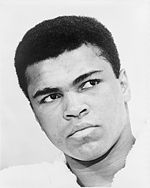- Clay v. United States
-
Clay v. United States 
Supreme Court of the United StatesArgued April 19, 1971
Decided June 28, 1971Full case name Cassius Marsellus Clay, Jr. also known as Muhammad Ali v. United States Prior history 430 F.2d 165 United States Court of Appeals for the Fifth Circuit Holding Since the Appeal Board gave no reason for the denial of a conscientious objector exemption to petitioner, and it is impossible to determine on which of the three grounds offered in the Justice Department's letter that board relied, petitioner's conviction must be reversed. Court membership Chief Justice
Warren E. BurgerAssociate Justices
Hugo Black · William O. Douglas
John M. Harlan II · William J. Brennan, Jr
Potter Stewart · Byron White
Thurgood Marshall · Harry BlackmunCase opinions Majority per curiam Concurrence Douglas Concurrence Harlan Marshall took no part in the consideration or decision of the case. Clay v. United States, 403 U.S. 698 (1971), was boxer Muhammad Ali's appeal of his conviction for refusing to report for induction into the United States military forces during the Vietnam War. His local draft board had rejected his application for conscientious objector classification. In a unanimous 8-0 ruling, the United States Supreme Court reversed the Fifth Circuit court's affirmation of the conviction. The Supreme Court of the United States found the government had failed to properly specify why Ali's application had been denied, thereby requiring the conviction to be overturned.
Contents
Background
In 1964, Ali failed the U.S. Armed Forces qualifying test because his writing and spelling skills were sub-par. However, in early 1966, the tests were revised and Ali was reclassified as 1A. This classification meant he was now eligible for the draft and induction into the U.S. Army. This was especially important because the United States was engaged in the Vietnam War. When notified of this status, he declared that he would refuse to serve in the United States Army and publicly considered himself a conscientious objector. Ali stated that "War is against the teachings of the Holy Qur'an. I'm not trying to dodge the draft. We are not supposed to take part in no wars unless declared by Allah or The Messenger. We don't take part in Christian wars or wars of any unbelievers." Ali also famously said in 1966: "I ain't got no quarrel with them Viet Cong ... They never called me nigger."[1][2]
Appearing for his scheduled induction into the U.S. Armed Forces on April 28, 1967 in Houston, he refused three times to step forward at the call of his name. An officer warned him he was committing a felony punishable by five years in prison and a fine of $10,000. Once more, Ali refused to budge when his name was called. As a result, on that same day, the New York State Athletic Commission suspended his boxing license and stripped him of his title. Other boxing commissions followed suit.
Facts of the case
Muhammad Ali appealed his local draft board's rejection of his application for conscientious objector classification. The Justice Department, in response to the State Appeal Board's referral for an advisory recommendation, concluded, contrary to a hearing officer's recommendation, that Ali's claim should be denied, and wrote that board that Ali did not meet any of the three basic tests for conscientious objector status. The Appeal Board then denied Ali's claim, but without stating its reasons. Ali refused to report for induction, for which he was thereafter tried and convicted.
Prior history
The Court of Appeals affirmed.
Arguments
In this Court the Government has rightly conceded the invalidity of two of the grounds for denial of petitioner's claim given in its letter to the Appeal Board, but argues that there was factual support for the third ground.
Decision of the Court
The Court held that, since the Appeal Board gave no reason for the denial of a conscientious objector exemption to petitioner, and it is impossible to determine on which of the three grounds offered in the Justice Department's letter that board relied, Ali's conviction must be reversed.
Bob Woodward and Scott Armstrong provide an account of the development of the decision in their book The Brethren. According to that account, Justice Marshall had recused himself because he had been U.S. Solicitor General when the case began, and the remaining eight justices initially voted 5 to 3 to uphold Ali's conviction. However, Justice Harlan, assigned to write the majority opinion, became convinced of Ali's sincerity as a conscientious objector after reading background material on Black Muslim doctrine provided by one of his law clerks, and concluded that claims by the Justice Department to the contrary had been a misrepresentation. Harlan changed his vote, tying the vote at 4 to 4. A deadlock would have resulted in Ali being jailed for draft evasion and, since no opinions are published for deadlocked decisions, he would have never known why he had lost. A compromise proposed by Justice Stewart, in which Ali's conviction would be reversed citing a technical error by the Justice Department, gradually won unanimous assent from the eight voting justices.[3]
Sources
- "Text file of Supreme Court opinion at Findlaw.com". http://caselaw.lp.findlaw.com/scripts/getcase.pl?navby=search&court=US&case=/us/403/698.html.
References
- ^ ""The Greatest" Is Gone". Time. 1978-02-27. p. 5. http://www.time.com/time/magazine/article/0,9171,919377-5,00.html. Retrieved 2007-08-04.
- ^ "This Week in Black History". Jet. 1994-05-02. http://findarticles.com/p/articles/mi_m1355/is_n26_v85/ai_15407999. Retrieved 2007-08-04.
- ^ Bob Woodward; Scott Armstrong (1981). The Brethren: inside the Supreme Court. Avon Books. pp. 157–160. ISBN 9780380521838. http://books.google.com/books?id=q1IEu9zWWTIC.
Categories:- Muhammad Ali
- American conscientious objectors
- United States Supreme Court cases
- 1971 in United States case law
Wikimedia Foundation. 2010.

